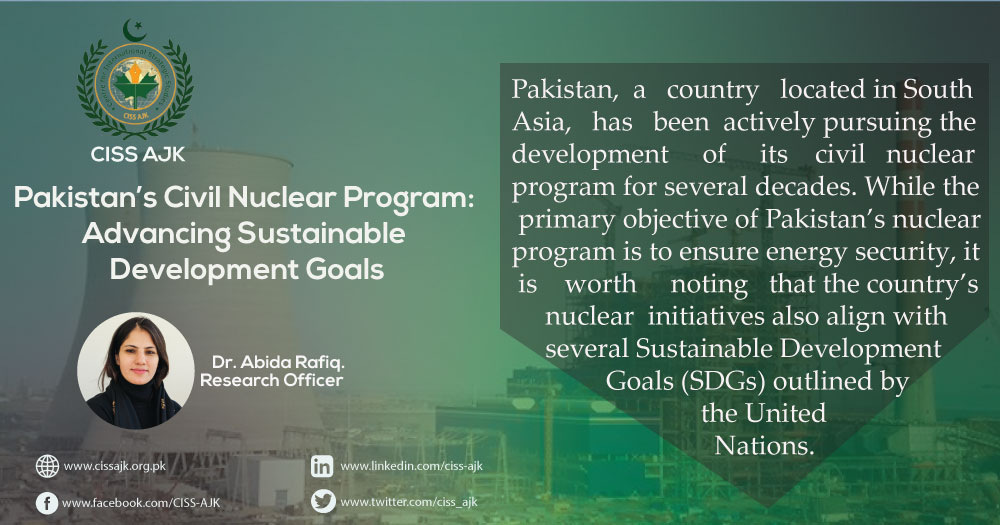793
Pakistan, a country located in South Asia, has been actively pursuing the development of its civil nuclear program for several decades. While the primary objective of Pakistan’s nuclear program is to ensure energy security, it is worth noting that the country’s nuclear initiatives also align with several Sustainable Development Goals (SDGs) outlined by the United Nations. This article explores Pakistan’s civil nuclear use and highlights its relevance in advancing sustainable development.
Pakistan faces significant energy challenges, including a high dependence on fossil fuels and an inadequate power supply. The country’s civil nuclear program contributes to SDG 7 by providing a reliable and sustainable source of clean energy. Nuclear power plants, such as the Karachi Nuclear Power Plant and Chashma Nuclear Power Plant, help diversify Pakistan’s energy mix, reducing its reliance on fossil fuels and promoting a transition towards low-carbon electricity generation. By embracing nuclear energy, Pakistan aims to address energy poverty, promote energy access, and mitigate climate change.
Including, a robust civil nuclear program promotes SDG 9 by fostering technological innovation and enhancing infrastructure development. Pakistan’s nuclear sector has spurred the growth of a skilled workforce, scientific research, and the development of indigenous nuclear technologies. This has led to advancements in areas such as nuclear medicine, agriculture, and water resource management. Moreover, Pakistan’s nuclear infrastructure, including research reactors and nuclear centers, has created opportunities for international collaborations, knowledge exchange, and capacity building.
As a signatory to the Paris Agreement, Pakistan is committed to combating climate change and reducing greenhouse gas emissions. Nuclear energy offers a climate-friendly alternative to conventional fossil fuel-based power generation. By investing in nuclear power plants, Pakistan can significantly reduce its carbon footprint and contribute to global efforts in mitigating climate change. The generation of clean and sustainable energy through nuclear power plants helps Pakistan achieve SDG 13 by promoting low-carbon development and fostering climate resilience.
International cooperation plays a crucial role in realizing the potential of Pakistan’s civil nuclear program to achieve the SDGs. Pakistan has actively engaged in collaborative efforts with various countries and international organizations to promote the peaceful use of nuclear energy. These partnerships have facilitated technology transfers, knowledge sharing, and capacity-building initiatives, enabling Pakistan to strengthen its nuclear capabilities while adhering to international non-proliferation norms and standards.
Pakistan’s civil nuclear program holds great potential for advancing the Sustainable Development Goals. Through the utilization of nuclear energy, Pakistan contributes to SDG 7 by ensuring affordable and clean energy access, while simultaneously addressing SDG 9 by fostering innovation and infrastructure development. The adoption of nuclear power also aligns with SDG 13 by promoting climate action and reducing greenhouse gas emissions. Furthermore, Pakistan’s commitment to international cooperation and partnerships reinforces SDG 17, highlighting its dedication to the peaceful use of nuclear technology. As Pakistan continues to harness the benefits of its civil nuclear program, it remains crucial to prioritize safety, transparency, and international collaboration to achieve sustainable development objectives while adhering to global norms and regulations.



